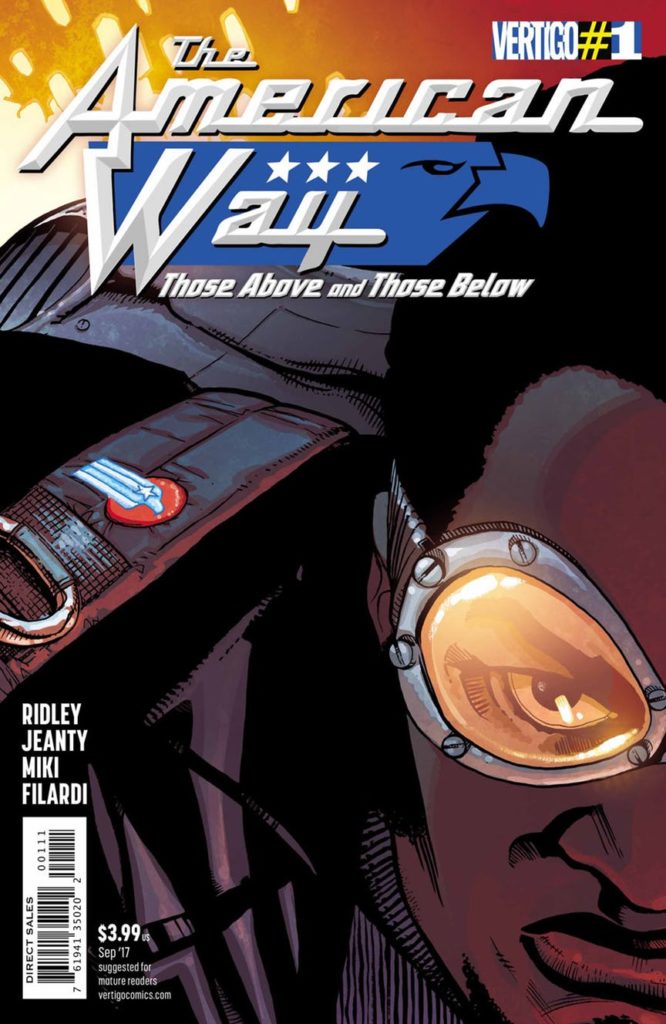
Ten short (from where I’m sitting, anyway) years ago John Ridley was far from a household name in the entertainment industry, yet alone an Oscar winner. That was well before 12 YEARS A SLAVE and American Crime, though, and now it’s a different story. A different world. Or is it?
Certainly Ridley returning to the only-slightly-fictionalized world of The American Way a decade after he and artist Georges Jeanty first created it is both a pleasant surprise as well as something of a coup for DC Comics’ perpetually-struggling Vertigo label, but 10 years (or thereabouts) have passed in the four-color world, as well, and the opening salvo in the new six-part The American Way: Those Above And Those Below shows that they haven’t necessarily been kind to protagonist Jason Fisher, a.k.a. The New American, or his surviving former Civil Defense Corps teammates. As 1972 dawns, Fisher is cleaning up the Baltimore ghettos by means both direct and decidedly brutal, while Amber (Waves) Eaton has become a Weather Underground/SLA-style revolutionary, and Missy (Ole Miss) Devereaux, now married to the governor of Mississippi, is being maneuvered into political office in the same way George Wallace’s wife was when that miserable old racist bastard was term-limited out of office. We know the paths of these one-time “allies” in an officially-sanctioned US government PR sham operation are bound to converge, but how and why remains to be seen yet. This issue guarantees one thing, though — it will invariably be fascinating to see the chess pieces moved (or fall?) into place.
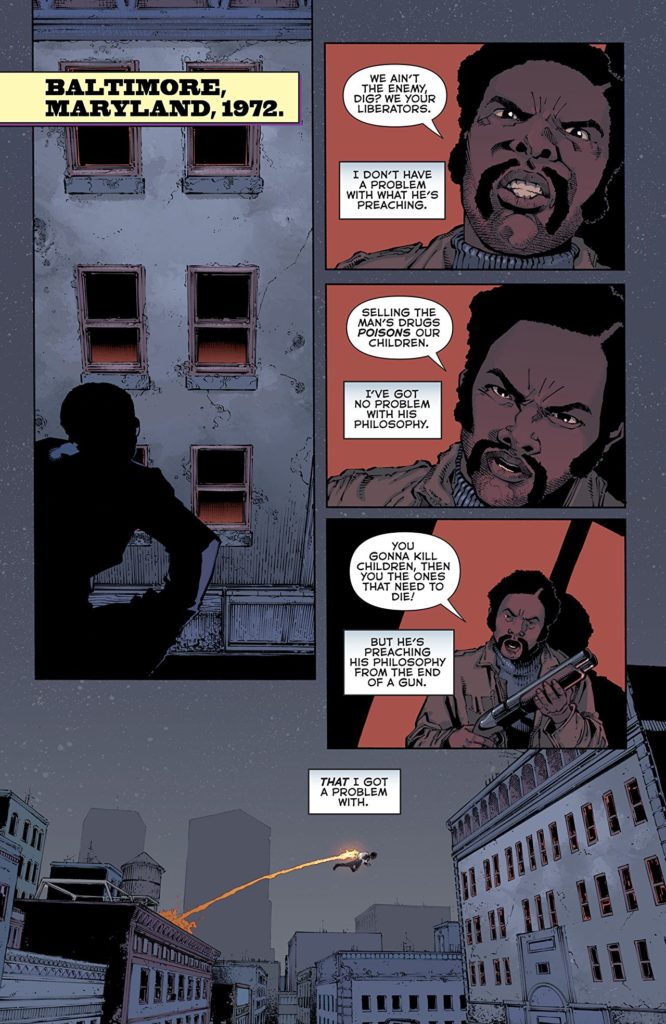
Tight, intricate plotting is a hallmark of all Ridley’s work, and if you haven’t read the first American Way series, rest easy: the basics of what happened in it are introduced into this one in a naturalistic, almost non-expository way that doesn’t hamper the forward momentum of the plot here in the least (and Vertigo has recently re-issued it in trade, as well, if you find yourself sufficiently motivated to see how it all began). The racial, economic, and social divisions explored with such candor last time out have clearly not improved and are certain to form this series’ thematic background, which should surprise no one, and while it can certainly be argued that Ridley is less than subtle in his proselytizing, it’s nevertheless effective and he at least uses his characters’ life circumstances to illustrate his points rather than taking the lazy and uninspired way out and simply utilizing them as authorial mouthpieces. The one potential “strike” against the relatively large ensemble cast on offer here is that Jason’s paralyzed Panther brother comes off as being more interesting and fully-rounded than does our titular hero himself, but hey — it’s part one, so we’ll see how all that goes.
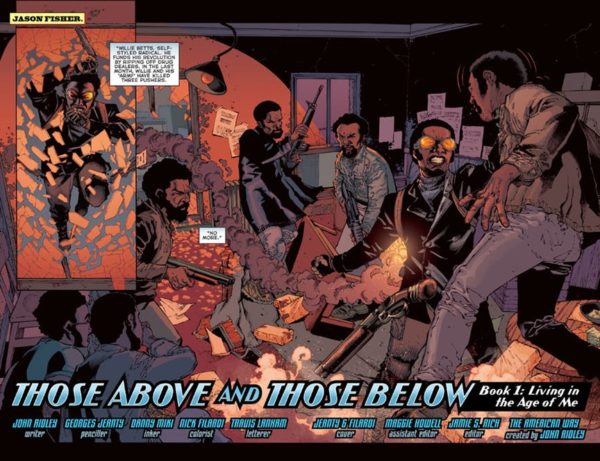
Jeanty, for his part, absolutely nails it on the art in this book. Action scenes have a crisp and dynamic flow to them, lower-key “talky” segments remain visually interesting and employ inventive-without-being-ostentatious “camera” angles, subtleties of expression and body language are right on the money, and the period setting is evoked smoothly and authentically. Danny Miki’s inks are faithful to the pencils in the best way, accentuating and enhancing detail without burying them under an extra layer of faux “style,” and Nick Filardi finishes everything off with expertly-chosen and highly atmospheric colors. “Cinematic” is not too shabby a shorthand description for this comic’s overall look, but it probably sells the effort by these firing-on-all-cylinders creators a bit short, truth be told. Maybe we should call it “Oscar-level cinematic” or something?
Still, it’s not a completely flawless effort: the decision (whether called for in the script or “ad-libbed” by the art team I have no idea) to slip a John Constantine doppleganger into the works for a panel threatens to take readers out of the book for a moment, it’s true, but what the hell — it’s high time he migrated back over to Vertigo by any means necessary, and if that’s the only gripe I’ve got, it’s a pretty small one. Almost seems petty to even bring it up. Still, in a comic that’s all about big (and, sadly, eternal) questions about race and class, a cheap (if admittedly fun) little aside like that stands out like a sore thumb and really does disrupt the rhythm of the storytelling, if only briefly.
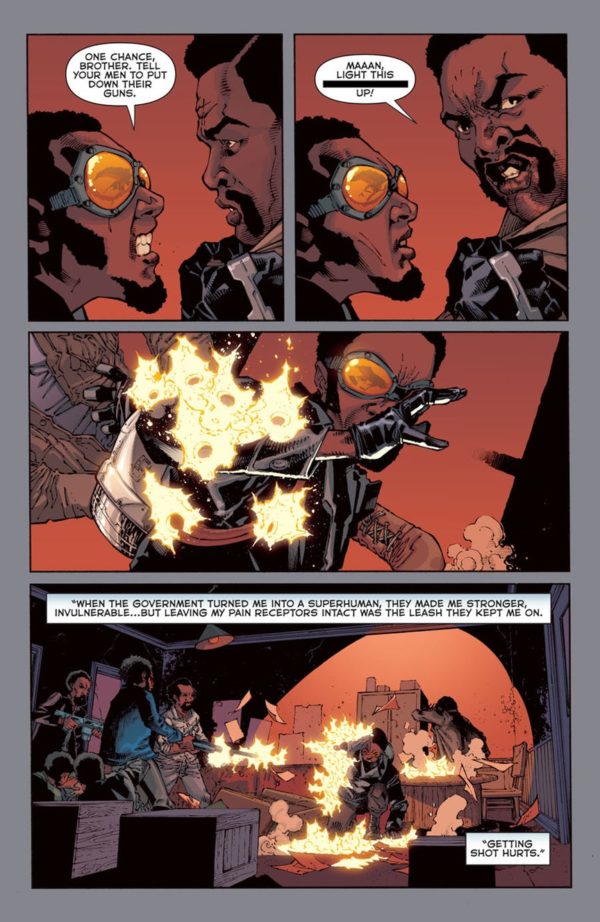
Apart from that and the drug-pusher villain that Jason is out to take down being a bit too broad of a caricature (he’s also a cold-blooded killer who flat-out enjoys the taking of human life rather than viewing it as unfortunate reality of his chosen “profession”), though, there is very nearly flawless comic-booking going on in the pages of The American Way: Those Above And Those Below #1. Topical and provocative without being preachy, accessible to new readers without resorting to “info-dump” condescension, and smart without feeling the need to call attention to its own intelligence, this is supremely effective, thought-provoking, resonant stuff. I’m down for the whole ride — and I respectfully suggest that you should be, as well.
Tags: Comic Books, Comics, Danny Miki, Georges Jeanty, John Ridley, Vertigo Comics

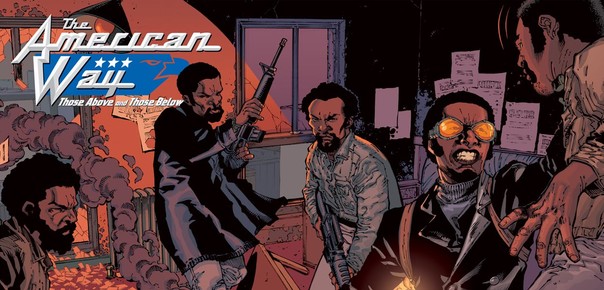
No Comments